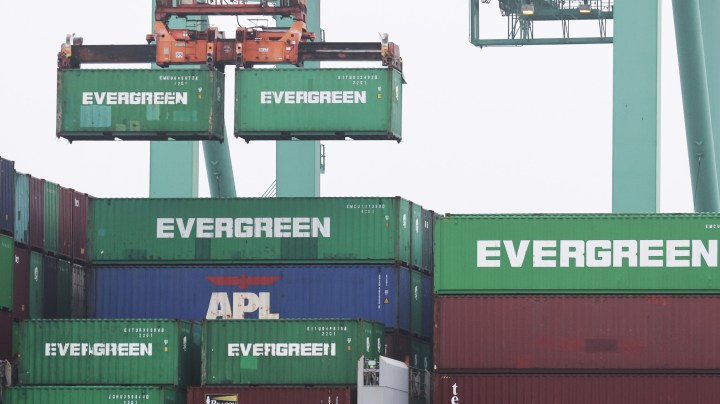
Supply chain snarls finally show signs of easing

Johnson & Johnson reported earnings on Tuesday, and revenues beat Wall Street forecasts. But maybe the bigger news — as far as the rest of the economy is concerned — is that the maker of Tylenol and Band-Aids said lingering supply chain problems were starting to get better.
It’s not just J&J. The New York Fed’s Global Supply Chain Pressure Index has shown five straight months of easing supply chain pressures. So all good news, right? Yes and no.
Let’s start with the positives: It’s now far cheaper to ship a container full of plush dolls or engine parts from China to Los Angeles than it might have been just a year ago.
“In 2021, a typical price was $20,000 to ship a container,” said Dale Rogers, a professor of logistics at Arizona State University. “And that really wasn’t sustainable, and now we’re at about $5,000 a container.”
Those epic port backlogs are pretty much gone too; the ports of Los Angeles and Long Beach don’t look like the container ship DMV anymore.
Additionally, many manufacturing companies have tried to reshore supply chains away from congested ports, said Deloitte consultant Paul Wellener.
“So we are seeing companies trying to bring product in its supply chain closer to its point of use,” he said.
The pandemic has also forced U.S. companies to invest more heavily in supply chain management, which is helping to bring down costs, Wellener said. But maybe the biggest reason supply chains are getting unsnarled? That’s the less-good news.
“Frankly, I think it’s more a symptom of falling demand,” said David Correll, who teaches logistics at the Massachusetts Institute of Technology.
Part of that is because consumers are now spending more on services. The other part? “[With] Inflationary pressures taking a bigger chunk out of people’s wallets, we’ve seen lesser demand strain put on supply chains,” Correll said.
That could be a bad sign for economic growth, but good news for prices coming down in the long run.
There’s a lot happening in the world. Through it all, Marketplace is here for you.
You rely on Marketplace to break down the world’s events and tell you how it affects you in a fact-based, approachable way. We rely on your financial support to keep making that possible.
Your donation today powers the independent journalism that you rely on. For just $5/month, you can help sustain Marketplace so we can keep reporting on the things that matter to you.

















